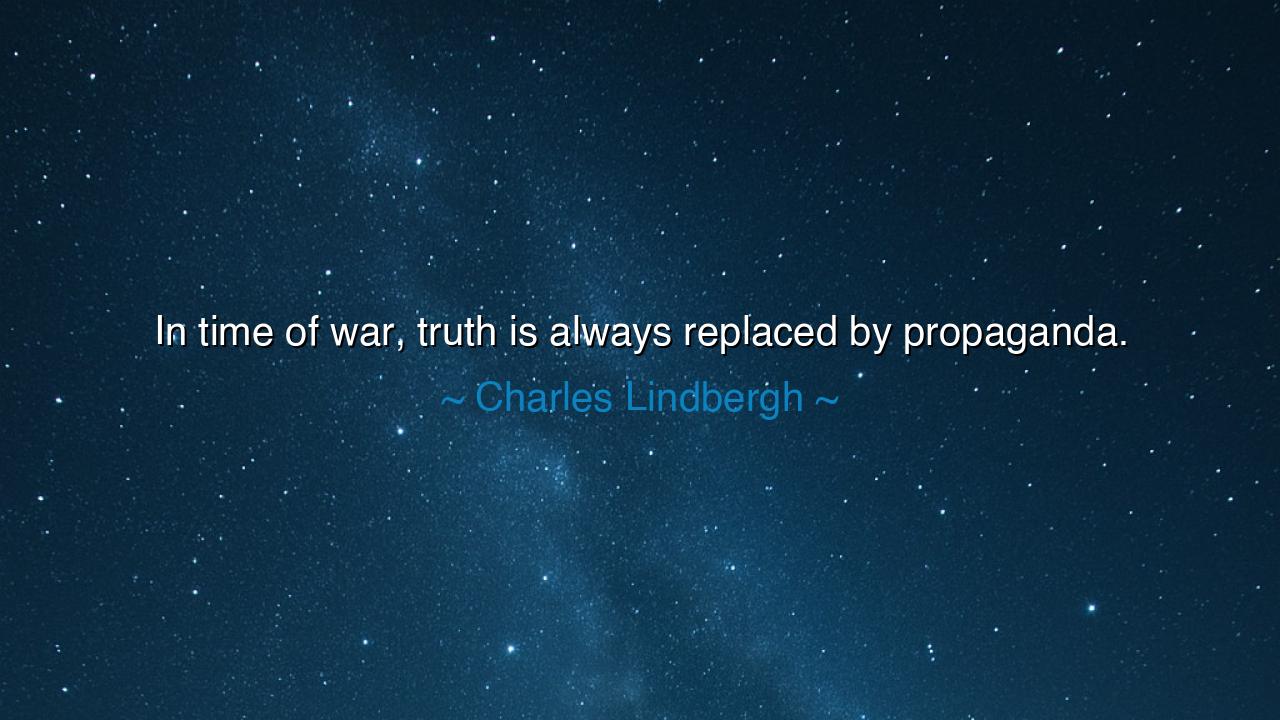
In time of war, truth is always replaced by propaganda.






Charles Lindbergh, a man once praised for his daring flight across the Atlantic yet later burdened by controversy, declared: “In time of war, truth is always replaced by propaganda.” These words reveal a sorrowful reality of human conflict: when the drums of battle sound, the voice of truth is drowned beneath the roar of crafted lies. In war, nations clothe themselves in righteousness, hiding their wounds, their errors, and their cruelties beneath banners of noble purpose. The people are fed not the bitter grain of truth, but the sweetened poison of propaganda, lest their hearts falter and their unity break.
The essence of this teaching is that truth is fragile in the storms of fear and rage. For the multitude, truth is too heavy to bear in times of strife. Leaders understand this, and so they weave narratives that inspire courage, justify violence, and vilify the enemy. The sword may win battles, but propaganda sustains them. In this sense, Lindbergh unmasks the hidden weapon of war—not cannons, but words; not bullets, but stories.
History bears ample witness. During the First World War, both sides poured oceans of ink into posters, pamphlets, and broadcasts. The enemy was painted as barbaric beasts, devoid of humanity, so that soldiers would march without hesitation. Tales were spread of atrocities—some real, many exaggerated or false—because the unvarnished truth might have dampened the will to fight. A war that consumed millions was fueled not only by artillery, but by relentless propaganda.
Again, in the Second World War, the Nazi regime perfected propaganda under Joseph Goebbels, controlling every newspaper, radio broadcast, and film reel. The German people were told of their superiority, their destiny, their righteousness, while the truth of their atrocities was hidden in darkness. At the same time, the Allied powers crafted their own narratives, shaping stories that would keep the fires of resistance burning. Thus, Lindbergh’s words echo: in war, truth rarely walks free; it is bound, gagged, or remade.
Yet there are those who defied the tide. The work of journalists and whistleblowers, such as those who exposed the Pentagon Papers during the Vietnam War, reminds us that even in the darkest hours, truth may still claw its way to the surface. But such truth is often despised, attacked, or dismissed as betrayal, for it pierces through the armor of national myth and reveals the bloodied body beneath. The warlord thrives on propaganda; the truth-teller is branded as enemy.
The lesson for us is profound: we must not accept words at face value in times of conflict. When leaders cry for battle, ask what truths lie hidden beneath their cries. When banners are raised high, look beneath the folds for the stains of deception. To seek truth in war requires courage greater than to wield a sword, for it means seeing through illusions that comfort the soul. A people who demand truth, even in times of strife, are less easily led into slaughter.
In practice, this means cultivating the habit of questioning, of weighing sources, of seeking knowledge beyond the easy voice of power. It means being vigilant not only in war, but in every realm of conflict—political, cultural, personal. When emotions surge and divisions rise, be wary, for that is when propaganda most easily triumphs. Train your mind to pause, to reflect, to ask: Who benefits from this tale? What truth might be silenced here?
Thus, children of tomorrow, let Lindbergh’s warning echo in your hearts: In time of war, truth is always replaced by propaganda. Guard yourselves, for falsehood marches swifter than armies, and deception slays more souls than swords. Seek truth as a warrior seeks light in the dark, and never let the fire of discernment be extinguished. For though propaganda may reign for a season, the truth, when cherished by steadfast hearts, shall endure beyond the ruins of war.






AAdministratorAdministrator
Welcome, honored guests. Please leave a comment, we will respond soon